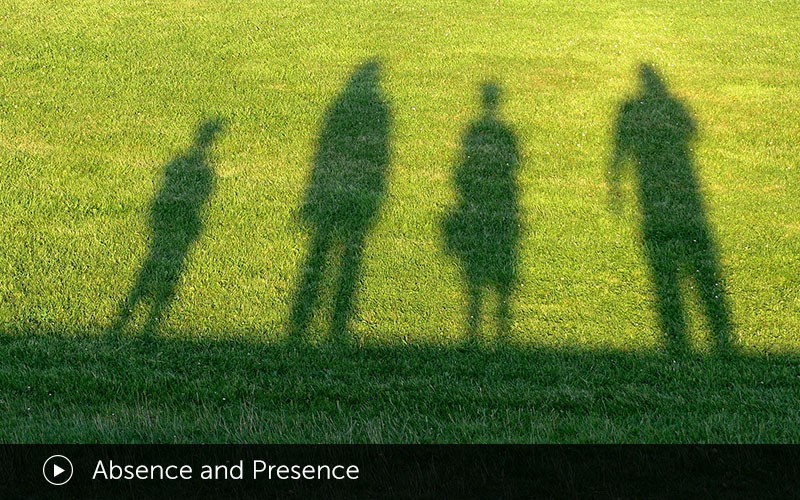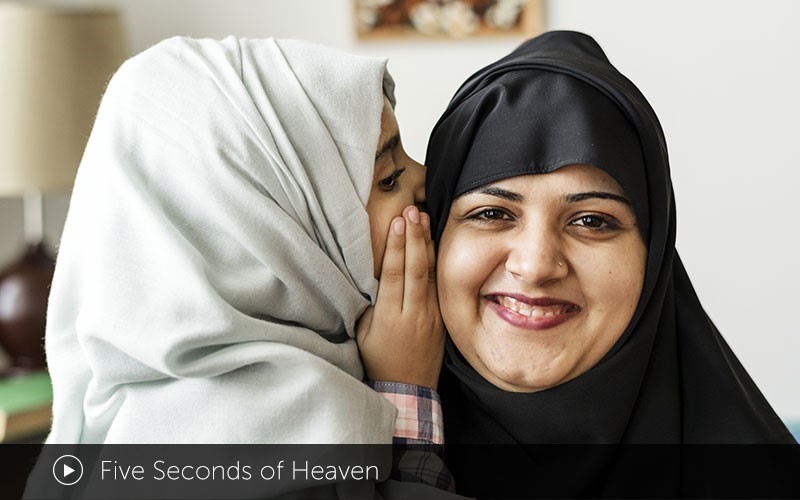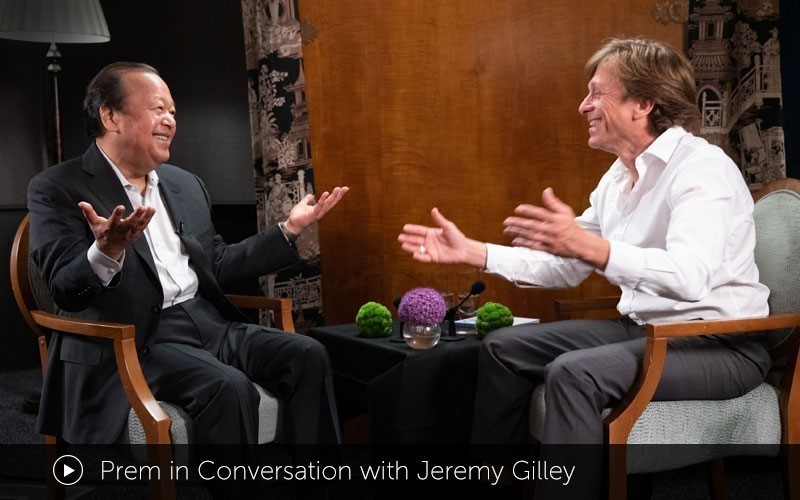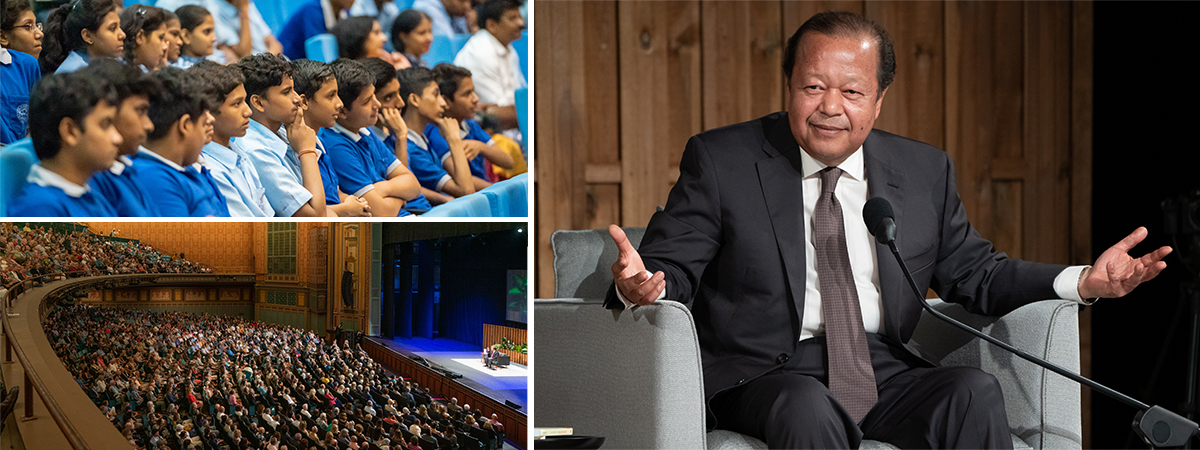Topics
 00:00:54
Guiding Young Children
Video
Duration : 00:00:54
00:00:54
Guiding Young Children
Video
Duration : 00:00:54
Question from audience member: Any suggestions for awakening the interest for the message or Knowledge for young children, in my case aged 10 and 14?
Prem Rawat: Leave them alone. Be a good mother and once in a while, for only your entertainment, you may play my event. But don't tell them they have to watch it. If you tell them they have to watch it, they won't, because they're such obedient kids, and you know this. So if you tell them to watch it, they won't. And if you don't tell them to watch it, they will.
Use some 'mother psychology' here, you know? Okay?
 00:07:21
Absence and Presence
Video
Duration : 00:07:21
Absence—is nothing! The presence is real; it is this breath that just came into ...
00:07:21
Absence and Presence
Video
Duration : 00:07:21
Absence—is nothing! The presence is real; it is this breath that just came into ...
We want our children to be good. We want our children to grow up well. What do we tell them when we see them in the morning? Monday or Tuesday, what do we tell them? "Are you ready? Are you ... You're late, you're going to be late. Get ready." We don't tell the, "I love you.“ We don't tell them, "I love you.” "So good to see you."
I know, in some cultures, women, men are shy to say, "I love you.” But can't you say the same thing another way? "So good to see you today." Aren't you glad to see them that day? Aren't you? Do you say it?
And what do you want? You want everybody in your family to be happy. After all, all the men that are here, you work very hard to make everybody happy in your family. Don't you? Don't you go to your job from morning till evening? Don't you work really, really hard to make them all happy? And do you once tell them you love them? No.
Strange! I find that very strange. Why is it wrong for you to be human? Aren't you human? Relationship of darkness, light. Relationship of absence, presence. All the things you imagine you are, you are not. But what you are, you don't know. So you imagine yourself to be a doctor, a lawyer, a housemother, a wife. An I.T.––"it". IT technician. It. "It" is referred to people without life, things without life. It. I.T. It means you go into a room, and try to plug wires and see if something works or doesn't work.
You ask somebody, "Excuse me, sir. Who are you?" "Oh, I'm a salesman." Really? You're not a human being? This relationship of absence and presence. We don't understand the presence. The presence is real. Absence is nothing.
What is the presence? The presence is, this breath just came into you. This is the presence. Do you understand the meaning of this breath? Do you understand the value of this breath? When you were born ... when you were born, when you came out of your mother's womb. Yes, all of you came out of a mother's womb. You better have come out of a mother's womb. Otherwise, you should be stuffed and sent to a museum. You all came out of a mother's womb.
In our societies we don't respect women. Women have one thing over every man. A woman can give birth to a man or a woman. A man can't do that. And we forget. We forget, we forget because we are playing the wrong game. Not of the presence, but of the absence.
And so far we keep this ... this is the game my friends, of ignorance. And what you are looking for, that word "Peace" indicates knowledge. Not ignorance. And the world is trying to figure out in the world of ignorance what knowledge means. Impossible. I say, impossible. Impossible.
Never figure it out. That's why the world doesn't know what peace is. Because we're playing a game of ignorance with ourselves, and wars that we hate are a result not of knowledge, but of ignorance. So, which world do you want to live in? Which world do you want to live in? The world of presence or the world of absence?
When you live in the world of absence, you have to have beliefs. Believe it's there, believe that's there, believe this there, believe this there, believe this there. Believe that Gods live just slightly above the clouds.
I'm a pilot. When I travel around the world, I fly myself. So you're climbing above the clouds going, "Hmm! Anybody there? Anybody there?" There's nothing there. Clouds, more clouds, more clouds, more clouds, more clouds, more clouds, more clouds.
We live in the world of present, in the world of knowledge ... Where? Where? Where? Then the answer is here, here, here, here.
- Prem Rawat
 00:02:38
Five Seconds of Heaven
Video
Duration : 00:02:38
The day you want to make five seconds of heaven for yourself...
00:02:38
Five Seconds of Heaven
Video
Duration : 00:02:38
The day you want to make five seconds of heaven for yourself...
Five Seconds of Heaven.
Just five seconds. If you have children at home, try to make five seconds of heaven for them. Just five seconds. Start with five.
You have a husband? Five seconds of heaven.
You have a wife? Five seconds of heaven.
What would make five seconds of heaven for a husband?
This is what’s amazing. Oh, it’s not a big breakfast. Listen. Five seconds.
What would make five seconds of heaven for your wife?
What about your children? Surely, give them toys. Right? No. Listen.
And the day you want to make five seconds of heaven for yourself, listen to your heart and you will have that five seconds of heaven.
To be fulfilled. To be in real joy, to have savored, to have known the divine because it was so close to you. To you.
- Prem Rawat
 00:03:57
Prem in Conversation with Jeremy Gilley
Video
Duration : 00:03:57
Love Like There’s No Tomorrow
00:03:57
Prem in Conversation with Jeremy Gilley
Video
Duration : 00:03:57
Love Like There’s No Tomorrow
Jeremy Gilley:
Can I just talk to you about a couple of things, then, just to help me—and maybe it helps some others. Can you just talk to me a little bit about the importance of family?
And, when I think about the world and I think about peace, I think about my family. And if my family’s together and if we can do that on a global scale, then we’d sort of create world peace.
Can you just tell me about the importance of us really holding ourselves together?
Prem Rawat:
Well, a family is that unit that’s a bumper in the front, so when a blow comes, it can soften it. The family is the nourishing, nurturing—somebody who can understand when nobody else will understand you—more than your friends.
And obviously, somebody who can give you advice, even at the peril of your anger, and give you good advice.
A family is you in another form. It's like, not just one flower, but a tree that flowers—that's a family. Look at the nature. It's not about just one flower. A plant will not just be satisfied with one flower—another one, another one, another one, another one, and before you know it, it's a family.
And its mission, its job, its purpose, whatever it is in this world, will be fulfilled far greater and far more beautifully when it is flowering, and there are a whole bunch of flowers on that plant, not just one flower.
Jeremy Gilley:
Yeah. Amazing, amazing. And that, on Peace Day 21st of September, one of the things that we've always said is like, "You know, well, what can I do?"
I'm like, "Well, you know, bring the family together. You know, bring the family together; be one on that day" with the sort of global family, and also the ones that we have. And so, hopefully, we’ll see a lot of that, you know, going on on the day.
So, a little bit about love. And I was sort of just thinking at the weekend, you know. I was with my little girl, I just adore her, right? My entire existence, nothing comes first.
You know, when I'm with her, there's no— it's about Rose; it's not about the work, right? It has to be, and it has to be that way for me, and I love it.
How do I contain it, you know? I mean, I love her so much. I kind of just sort of want to do everything. I mean, have you ever sort of felt that?
Have you—if you have any sort of words of wisdom for us, you know, both in terms of personal relationships or with family relationships? When you love so much, you know, it can kind of almost sometimes be too much.
Prem Rawat:
It never is.
Jeremy Gilley: It never is? Okay, great.
Prem Rawat:
It never can be. It can never be. Stop thinking; start loving. Don't think about love. Feel the love in your life. It's a gift. It always won’t be the same. It won't.
It changes. You will change, and one day you won't be here. So, love like there is no tomorrow. Stop thinking about what it all means; start loving. If we did that, this world would be a different place today.
Jeremy Gilley:
Fantastic.
Onscreen text:
The world would be a different place today.
 00:07:00
The Great Pyramids
Video
Duration : 00:07:00
The good is like a pyramid. Just a little bit at the top, and a lot more, the fu...
00:07:00
The Great Pyramids
Video
Duration : 00:07:00
The good is like a pyramid. Just a little bit at the top, and a lot more, the fu...
So now let me tell you about the good and the bad. The good is like this—like a pyramid. Just a little bit at the top, and a lot the further down you go. The bad is like an upside-down pyramid. You see all the consequences; you see all the problems; you see all, “Oh, this is terrible, oh....” But if you get down to the bottom of it, it’s just one little thing.
And the good is the same way, but upside down. You hardly see it, that it’s good. It’s so little on top; you hardly notice there is anything good. But keep digging; it gets better, and better, and better, and better, and better.
Next time, look carefully—because that’s how you keep missing the good and falling into the trap of the bad—because the bad is huge. It comes with its problems blaring right in your face. And how does it resolve itself? It turns out to be a little thing, tiny little thing.
Tiny little thing. The good? Inversely? All you get to see at first is this tiny little thing, but if you accept—and most of the time you will overlook it, what is the good.
Let me give you an example; this will maybe clarify the two pyramids. You wake up in the morning—you wake up in the morning, right? You come to your kitchen or family breakfast area, and there is your family. And you notice that one of your kids, he’s just angry.
“Dah-deh-deh-deh-deh-deh, dah-deh-deh-deh-deh-deh, this is wrong; that’s wrong; I don’t want to go to school; I’d, I’d, I’d, I’d, I hate school; why do I have to go to school, Dad?” You’ve seen all this. Get to the bottom of it: “I didn’t do my homework.”
The good? You come downstairs and that child says—now in good mood because you let them stay out of school, so they could finish the homework, and then they can—“Good morning, Dad.” There is your opportunity, in that “good morning, Dad.” If you took it: “How are you today?” you have just converted raw strings into metal chains of relationship, of love.
But most of the days, you just, “Yeah, good morning.” You missed it; you have missed it. Somebody says to you, “I love you.” And what are you good at? “I love you too.” You, you just missed it. Just missed it.
And here comes a breath into you, and maybe you took that one minute, sat down somewhere, and you went, “Hmmmh, hmmm....” Just that one breath—you missed it. You missed it, because now you’re thinking about this and you’re thinking about that. But you just could have sat down, as you are, as you did and understand you have the gift of life.
And you keep going; it’ll get more and more and more and more and more and more and more, and you will begin to fill with gratitude. And from then on, it’s like fireworks. “Vvrr-vvrr-vvrr-vvrr, vvrr-vvrr-vvrr....”
The bad, we go for; good—we have not learnt how to detect that little, little, little thing of good. So, your dharma, or dharm, begins to be that duty that you have to the self, to not miss those little things in your life—the opportunity to fill your heart with gratitude, the opportunity to acknowledge what you have been given.
Aren’t you good at knowing when the problem is coming your way? “Aye-aye-aye-aye!” Are you also that good at knowing when the good is coming your way? Because if you were, you would realize, it’s so much good just keeps coming, and coming, and coming, and coming, and coming, and coming. That’s life!—the gift that you have been given.
- Prem Rawat





